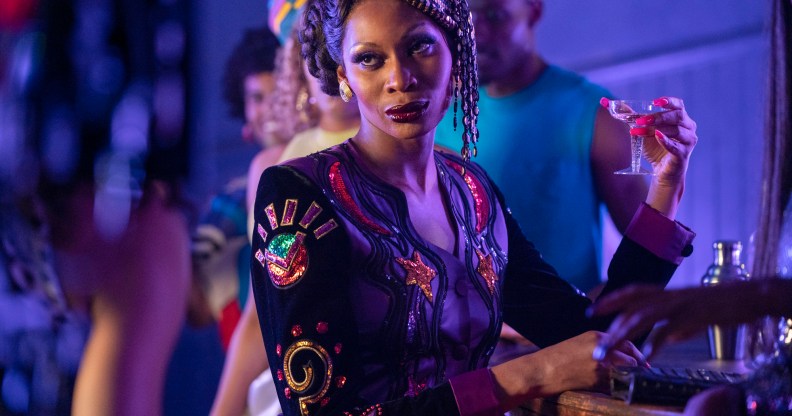There are now more LGBT characters on TV than ever before

Pose’s Electra Abundance, played by Dominique Jackson. (FX)
Pose, Euphoria and The L Word: Generation Q are contributing to a record number of queer characters on TV.
GLAAD has revealed that LGBT+ representation on TV is better than ever in its annual Where We Are On TV report.
The LGBT+ media monitoring organisation found that in the 2019-20 season, LGBT+ characters make up 10.2 percent of all series regulars on scripted primetime programming in the US, up 1.4 percent from the previous year.
It counted 90 LGBT+ characters out of 879 network TV series regulars, with an additional 121 on premium cable networks (HBO, FX, Showtime etc) and 109 more on streaming services.
For the first time, queer women outnumber queer men on screen by 53 per cent to 47 per cent, thanks in part to programmes such as Batwoman.
The number of trans characters increased from 26 to 38, though GLAAD points out that two shows – Pose and The L Word: Generation Q – account for more than a quarter of these.
There were also increases in the number of bisexual characters (128 vs 117) and characters living with HIV (nine, from seven).
The representation of queer people of colour also improved and for the first time exceeded the representation of queer white people.
Of the 120 LGBTQ regular and recurring characters on broadcast TV, 62 (52 per cent) are people of colour, however there was a decrease on streaming platforms.
Overall the 2019-20 season was the best on record for ethnic diversity regardless of sexuality, with POC making up 47 per cent (409) of all broadcast regulars.
Sarah Kate Ellis, president and CEO of GLAAD, commended TV networks for improving on representation.
“Last year, GLAAD called on the television industry to increase the number of LGBTQ characters and more accurately reflect the world we live in, and they responded by exceeding this challenge,” she said.
“At a time when the cultural climate is growing increasingly divisive, increased representation of LGBTQ stories and characters on television is especially critical to advance LGBTQ acceptance.”
GLAAD reported room for improvement in the representation of asexual people. It counted just one asexual character, Todd Chavez on Netflix’s BoJack Horseman, which will come to an end in January 2020.
The report also reported shortcomings in the representation of people with disabilities.
Just 3.1 per cent of broadcast regulars (27 characters) are people with disabilities, though the number of LGBT+ characters with disabilities rose from four to 10 (this includes characters living with HIV).

